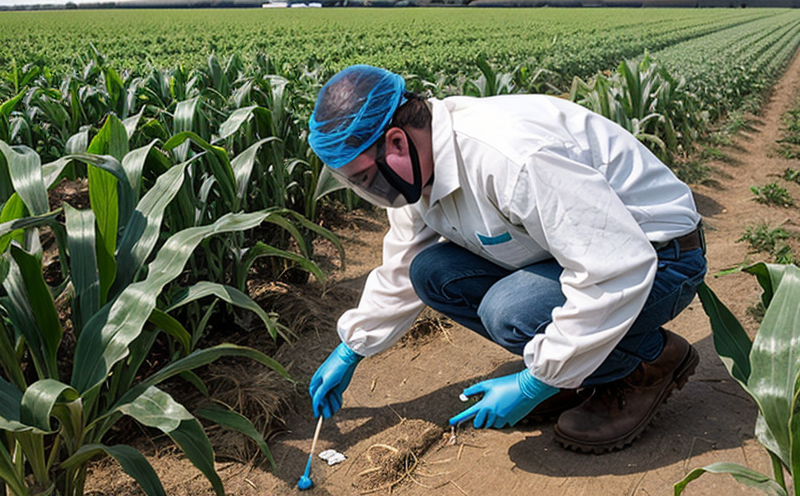Heptachlor Residue Testing in Crops
The presence of heptachlor residues in crops poses significant risks to human health and the environment. Heptachlor is a synthetic organochlorine insecticide that was widely used until its ban in many countries due to its persistence, bioaccumulation potential, and high toxicity levels. Despite being phased out, it continues to be detected in various agricultural products worldwide.
Our laboratory offers comprehensive testing services for heptachlor residues in crops using validated methods compliant with international standards such as ISO 3059:1984 and EU Directive 2002/657/EC. The process involves meticulous sample preparation, extraction techniques like QuEChERS (Quick, Easy, Cheap, Effective, Rugged, and Safe), followed by quantitative analysis using highly sensitive instruments such as Gas Chromatography-Mass Spectrometry (GC-MS).
Our approach ensures accurate measurement down to detection limits specified in relevant guidelines. This precision is crucial for ensuring compliance with local regulatory frameworks and international trade agreements. Compliance officers can rely on our rigorous testing protocols to avoid non-compliance issues that could lead to product recalls or financial penalties.
R&D engineers benefit from our detailed residue profiles which help identify potential contamination sources early in the supply chain. This information is invaluable for developing safer agricultural practices and improving crop quality. For quality managers and procurement teams, our results provide assurance that only safe products enter their operations, thereby protecting brand reputation and consumer trust.
We also offer specialized testing services tailored to specific crops known to have higher susceptibility to heptachlor contamination. Our expertise extends beyond routine testing; we conduct thorough investigations into the causes of detected residues when necessary, providing actionable insights for corrective actions. This comprehensive service ensures that stakeholders are well-informed and prepared against any challenges related to heptachlor presence in their agricultural products.
Our commitment to excellence is reflected in our state-of-the-art facilities equipped with advanced analytical tools designed specifically for pesticide residue analysis. By leveraging cutting-edge technology, we maintain accuracy and reliability throughout every step of the testing process. Our experienced scientists apply best practices ensuring consistent quality across all tests performed here.
Customer Impact and Satisfaction
The demand for safe agricultural products has never been higher, driven by growing consumer awareness about food safety and environmental sustainability. With increasing scrutiny from regulatory bodies, companies must ensure their products meet stringent standards regarding pesticide residues. Our heptachlor residue testing service plays a pivotal role in meeting these challenges head-on.
Customers appreciate our transparent communication throughout the testing process, including detailed explanations of methodologies used and results obtained. This level of transparency fosters trust between us and our clients, enhancing overall satisfaction levels. Moreover, we offer turnaround times that cater to urgent needs while maintaining high standards of accuracy.
One key aspect contributing to customer satisfaction is our ability to provide customized solutions based on individual requirements. Whether it's adapting tests to specific crop types or implementing more stringent thresholds aligned with emerging trends in global markets, we adapt flexibly yet consistently deliver reliable outcomes.
Feedback from satisfied customers highlights several benefits they derive from partnering with us:
- Timely delivery of resultsEnsures timely decision-making and reduces downtime.
- Accurate and reliable dataProvides confidence in product safety, enhancing brand reputation.
- Compliance supportHelps avoid legal issues associated with non-compliance.
- Tailored servicesMeets unique needs, whether for research or operational purposes.
- Expert scientific adviceGuides stakeholders towards informed decisions about their products.
- Cost-effective solutionsOptimizes resource utilization without compromising quality standards.
- Continuous improvement initiativesEnsures sustained performance and competitiveness within the industry.
- Comprehensive reportingOffers clear, actionable insights for stakeholders at all levels of operation.
Competitive Advantage and Market Impact
In today's competitive market landscape, maintaining compliance with stringent regulations is not just a necessity—it’s an opportunity. By offering reliable heptachlor residue testing services, we empower our customers to stay ahead of regulatory changes, ensuring their products meet international standards. This proactive approach enhances brand reputation and builds long-term relationships with trusted suppliers.
The ability to detect heptachlor residues early in the supply chain allows companies to take corrective actions promptly, preventing costly recalls or withdrawals from shelves. For R&D teams, this capability translates into faster innovation cycles by identifying potential issues before they become public knowledge, giving them a competitive edge.
Our comprehensive testing services also support market expansion efforts by providing robust evidence of product safety. This information is crucial for entering new markets where stringent regulations are in place or expanding into regions previously inaccessible due to compliance concerns. By demonstrating adherence to global best practices, companies can open doors to lucrative international opportunities while maintaining a strong domestic presence.
The demand for safer agricultural products continues to rise globally. Companies that invest early in robust quality assurance systems will reap benefits not only now but also as the industry evolves towards more stringent regulations and higher consumer expectations. Partnering with us ensures you are prepared for future challenges, giving your business a sustainable competitive advantage.
Use Cases and Application Examples
Heptachlor residue testing finds application across various segments of the agricultural sector, from large-scale farms to smallholder operations. Here are some typical scenarios where our service proves invaluable:
- Post-harvest TestingEnsuring crops meet export standards by verifying absence of heptachlor residues.
- Supply Chain AuditsProviding assurance to buyers about the safety and reliability of purchased materials.
- Product DevelopmentIdentifying potential contamination risks early in product development phases.
- Compliance AuditsSupporting internal audits to ensure ongoing compliance with local and international regulations.
- Research ProjectsOffering detailed insights into the persistence and bioaccumulation of heptachlor residues in different crops.
- Field StudiesAssessing environmental impact through monitoring heptachlor levels in soil, water bodies, and air.
These examples illustrate how our service addresses diverse needs within the agricultural sector. By addressing these challenges effectively, we contribute significantly to maintaining food safety standards and promoting sustainable farming practices worldwide.





